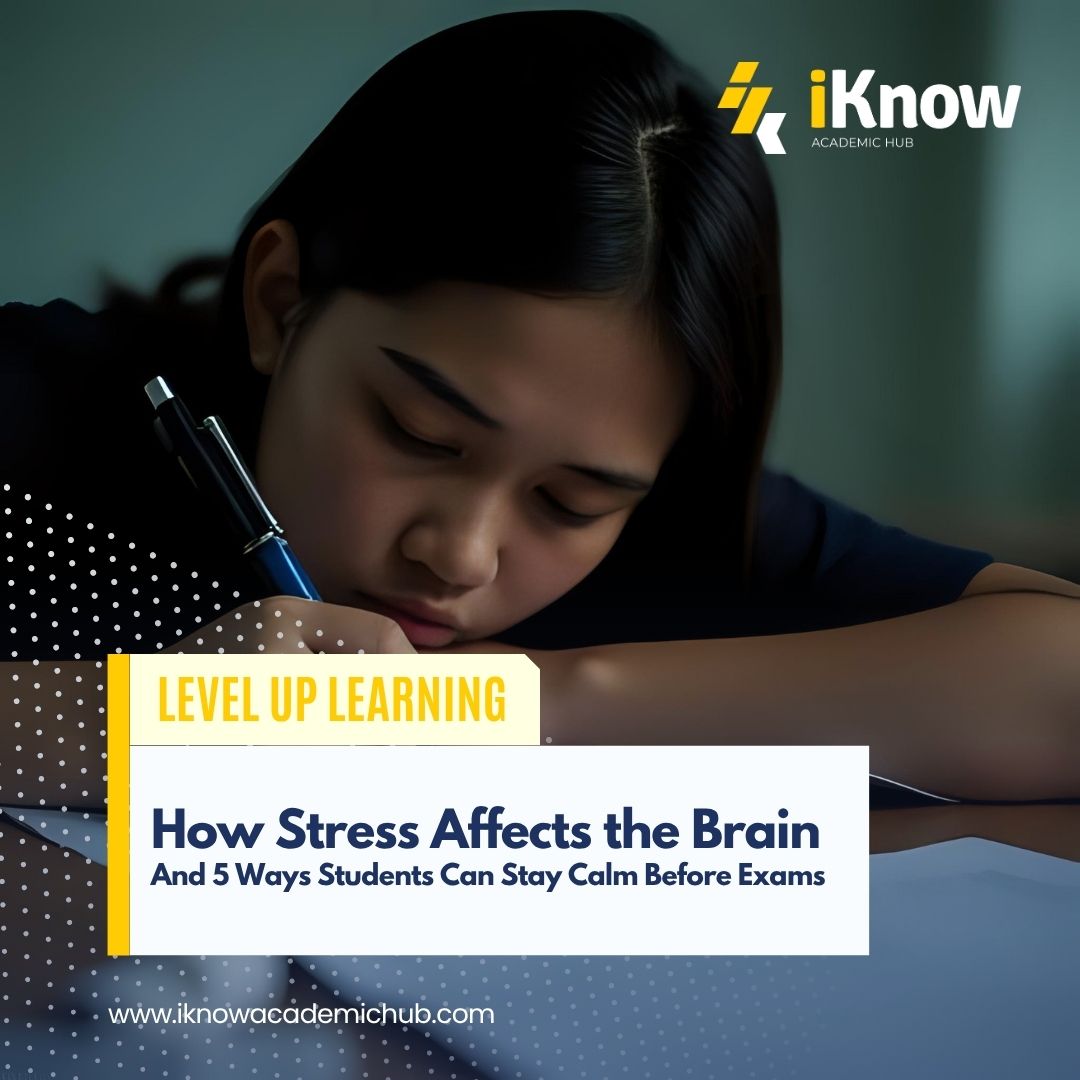What to Expect in the ACET: Inside the Ateneo Entrance Exam
Fri Oct 17 2025

Dreaming of becoming a true Atenean? Before you can walk through the gates of the Loyola Schools, you must first conquer one of the most challenging entrance tests in the country—the Ateneo College Entrance Test (ACET).
The ACET is known for its tight time limits, analytical questions, and emphasis on critical thinking. It measures how well you can reason, comprehend, and compute under pressure—skills central to Ateneo’s academic philosophy.
In this guide, we’ll walk you through what to expect on test day—from the format to question types—and how a focused ACET review can help you prepare with confidence.
The ACET at a Glance
The Ateneo College Entrance Test (ACET) is designed to evaluate not just what you know, but how you think. It measures your ability to process information quickly, apply logic, and perform under time pressure—skills essential to Ateneo’s holistic and rigorous academic environment.
The exam typically runs for two to three hours, depending on the year’s structure, and covers the following key areas:
-
English Proficiency – Tests your grammar, sentence construction, and writing mechanics.
-
Reading Comprehension – Measures how well you understand passages, interpret meanings, and identify main ideas.
-
Vocabulary Proficiency – Assesses your command of words, context clues, and correct usage.
-
Verbal Analogy – Evaluates reasoning and relationships between words and concepts.
-
Mathematics Proficiency – Includes algebra, geometry, arithmetic, and data interpretation, focusing on logical problem-solving.
-
Numerical Ability – Tests how efficiently and accurately you can compute and interpret numerical data.
-
Abstract Reasoning – Involves identifying patterns, sequences, and logical relationships using figures or shapes.
-
Logical Reasoning – Measures your ability to analyze arguments, spot assumptions, and draw valid conclusions.

Time Pressure: The True Test of the ACET
Many students say the most challenging part of the ACET isn’t just the difficulty—it’s the time pressure. Each section moves fast, giving you little time to linger on one question.
This makes time management a crucial part of your preparation. During your ACET review, simulate the actual test by practicing under strict time limits. Learn to skip difficult questions and return to them later. Building this habit can greatly improve your pacing and accuracy.

Question Types to Expect
Here’s what you’ll encounter during the ACET:
1. English and Reading Comprehension
Expect long passages with abstract or analytical themes. You’ll be tested on inference, main idea recognition, and understanding the writer’s tone or perspective. Grammar questions are also context-based, requiring careful reading and comprehension.
2. Vocabulary and Verbal Analogy
These sections test your grasp of relationships between words. You’ll encounter analogy pairs (e.g., teacher : classroom :: doctor : hospital) that require logical connections. Vocabulary items may include synonyms, antonyms, and context clues.
3. Mathematics and Numerical Ability
Prepare for a mix of algebraic equations, geometry problems, arithmetic word problems, and data interpretation. Ateneo emphasizes reasoning and accuracy, so memorization alone won’t suffice. You’ll need to think critically and compute efficiently.
4. Abstract and Logical Reasoning
This part measures your non-verbal intelligence—how well you recognize patterns, sequences, and logical progressions in figures or symbols. Logical reasoning items test argument structure, assumptions, and valid conclusions.
How to Prepare for Success

A strong ACET review should train your speed, strategy, and stamina—not just your subject knowledge.
Here’s how to prepare effectively:
-
Simulate the actual test. Take full-length mock exams under timed conditions.
-
Focus on weak areas. Strengthen your reading comprehension and math reasoning.
-
Build test endurance. Practice staying focused for 2–3 hours straight.
-
Master strategy. Learn to spot easy points first, then tackle harder questions.
-
Reflect often. For essays, read about social issues and form thoughtful opinions.
At iKnow Academic Hub, our ACET Review Program focuses on more than memorization. We train you to think critically, manage time, and approach questions strategically through comprehensive modules, mock exams, and expert mentoring.
Test Day: What to Expect
On exam day, expect strict proctoring and a highly organized process. Bring only essentials:
-
Admission slip
-
Valid ID
-
Two pencils and an eraser
Electronic devices and calculators are not allowed. Listen carefully to instructions, budget your time per section, and trust your preparation.
The ACET is more than just an entrance test—it’s Ateneo’s way of finding students who can think critically, lead with integrity, and contribute meaningfully to society. While it’s challenging, the right ACET review plan can help you face the exam with confidence and clarity.
At iKnow Academic Hub, we believe smarter preparation builds stronger futures. Join our ACET Review Program today and take the first step toward your dream of becoming an Atenean.
Read more blogs
See all blogs
How Stress Affects the Brain — And 5 Ways Students Can Stay Calm Before Exams
Mon Oct 13 2025Exams are one of the most stressful times in a student’s life — and for parents, watching their child struggle through sleepless nights can be just as worrying. But did you know that stress affects the brain in ways that can actually make studying harder? When stress levels rise, the brain’s ability to focus, store, and recall information drops. Understanding this science can help both students and parents take smarter steps toward a calmer, more effective review period. At iKnow Academic Hub, we believe that managing stress is just as important as mastering the lessons — because confident minds learn best. How Stress Affects the Brain When you’re stressed, your brain releases hormones like cortisol and adrenaline. These chemicals are useful in short bursts — they help you stay alert and energized. However, too much of them can backfire. Memory and focus decline. High cortisol levels interfere with the hippocampus, the part of the brain that stores memories. This means facts you’ve studied may not “stick” as well under pressure . Decision-making slows down. Chronic stress affects the prefrontal cortex, which is responsible for planning and problem-solving. That’s why you might “blank out” during an exam even if you know the answer . Learning becomes harder. Stress reduces the brain’s ability to form new neural connections — essentially, making it harder to absorb new information efficiently . The takeaway? The calmer the brain, the sharper it performs. 5 Ways Students Can Stay Calm Before Exams 1. Create a Realistic Study Plan Instead of cramming, break your review materials into smaller chunks over several days. This helps reduce anxiety and improves long-term memory retention. A steady pace signals to your brain that there’s no “danger” — just progress. 2. Practice Mindful Breathing Just a few minutes of deep breathing can lower cortisol and increase oxygen flow to the brain. Try the 4-7-8 technique: inhale for 4 seconds, hold for 7, and exhale for 8. It helps reset your nervous system for better concentration. 3. Get Enough Sleep Sleep is when the brain consolidates memories — it’s like pressing the “save” button after hours of study. Pulling an all-nighter might seem productive, but it actually decreases recall and reasoning ability the next day . 4. Move Your Body Exercise doesn’t just relieve stress — it boosts dopamine and serotonin, chemicals that improve mood and focus. A short walk or stretching break between study sessions can do wonders for your mental clarity. 5. Find Support in a Study Community Sometimes, stress comes from feeling alone. Joining a review group or study program helps students stay motivated and confident. At iKnow Academic Hub, our supportive learning community and guided review sessions help students face exams with calm and clarity — because no one should face exam stress alone. For Parents: Encouraging Without Pressuring Parents play a big role in how students handle exam stress. Instead of saying “You have to top the test,” try “I’m proud of how hard you’re trying.” Simple reassurance builds emotional safety, which in turn improves performance. At iKnow, we encourage parents to see review programs not just as academic tools, but as emotional support systems — a place where students can find guidance, structure, and encouragement. Stress is part of every academic journey, but it doesn’t have to control it. When students learn how stress affects the brain, they gain the power to manage it — to study smarter, think clearer, and perform better. At iKnow Academic Hub, we help learners prepare not only with academic excellence but with emotional confidence. Our review programs for college and high school entrance exams are designed to build both knowledge and resilience. At iKnow Academic Hub, we believe smarter preparation builds stronger futures. Join our programs today and get the guidance you need to succeed. References: McEwen, B. S. (2017). Neurobiological and systemic effects of chronic stress. Nature Medicine. Arnsten, A. F. T. (2009). Stress signalling pathways that impair prefrontal cortex structure and function. Nature Reviews Neuroscience. Lupien, S. J. et al. (2009). Effects of stress throughout the lifespan on the brain, behaviour and cognition. Nature Reviews Neuroscience. Walker, M. (2017). Why We Sleep: Unlocking the Power of Sleep and Dreams. Scribner.
Read more
Are You a Morning Owl or Night Owl? Best Study Times Based on Psychology
Mon Oct 13 2025Have you ever noticed that some students thrive at 6 a.m., while others can’t focus until midnight? It’s not just a matter of preference — it’s biology. According to research on circadian rhythms, our internal body clock influences when we feel most alert, focused, and creative throughout the day . Understanding this can help you study smarter, not harder. At iKnow Academic Hub, we believe effective studying starts with knowing yourself — including when your brain performs best. Whether you’re an early riser or a night owl, finding your ideal rhythm can make every study session more productive and less stressful. The Science Behind Study Productivity Your circadian rhythm is a 24-hour biological cycle that regulates sleep, alertness, and body temperature. It’s controlled by the brain’s suprachiasmatic nucleus, which responds to light and darkness cues . Morning types (“larks”) feel energized early in the day and prefer to complete mentally demanding tasks before noon. Evening types (“owls”) peak in the late afternoon or night, often finding focus and creativity after sunset. A study by the University of Toronto found that morning people tend to experience higher positive emotions and proactive behavior, while night owls often perform better in tasks requiring creative problem-solving . So instead of forcing yourself to study at “ideal” times, align your schedule with your natural energy pattern. If You’re a Morning Owl ☀️ Peak performance time: 6 a.m. – 12 p.m. Why it works: Morning learners benefit from higher alertness, stable focus, and fewer distractions early in the day. Studies show that working memory and concentration are strongest during daylight hours . Ideal routine: 6:00–7:00 a.m.: Light exercise or meditation to activate focus 7:00–9:00 a.m.: Review difficult subjects (Math, Science, Logical Reasoning) 9:00–11:00 a.m.: Take practice tests or mock exams 1:00 p.m. onward: Light review, flashcards, or group discussions Pro tip: If you’re preparing for college entrance exams like the UPCAT or DOST-SEI, morning sessions simulate actual testing conditions — which usually happen before lunch. If You’re a Night Owl 🌙 Peak performance time: 7 p.m. – 1 a.m. Why it works: Night owls often show enhanced creative thinking and problem-solving at night when distractions are minimal and the environment is calmer . Ideal routine: 6:00–7:00 p.m.: Have a light meal and set up a distraction-free study zone 7:00–9:00 p.m.: Study concept-heavy subjects like Chemistry or Literature 9:00–11:00 p.m.: Practice problem-solving or essay writing 11:00 p.m.–12:30 a.m.: Review summaries or watch recorded lectures Pro tip: Balance late-night study sessions with adequate rest. Lack of sleep affects concentration and retention, no matter your body clock. Hybrid Schedule: For Students with Unpredictable Routines Not everyone fits neatly into a single category. Some students’ schedules shift due to school, training, or family obligations. If that’s you, aim for consistency over perfection — set a fixed study time daily, even for short periods. Cognitive psychology research shows that regular routines enhance long-term memory retention and reduce procrastination . Try the Pomodoro method (25 minutes study, 5 minutes break) and track your energy levels throughout the week. Over time, you’ll discover your own “golden hours” — when you learn best. How iKnow Academic Hub Helps You Study Smarter Whether you’re a morning or night learner, iKnow Academic Hub offers flexible review schedules, recorded lessons, and mock tests you can access anytime. Our programs for UPCAT, ACET, DCAT, USTET, and PSHS-NCE are designed to adapt to your pace — because success isn’t about studying more, but studying at the right time. At iKnow Academic Hub, we believe smarter preparation builds stronger futures.Join our review and tutorial programs today and unlock your potential — on your own clock. References [1] American Psychological Association. (2023). Circadian Rhythms and Human Behavior.[2] National Institutes of Health (NIH). (2022). The Body’s Internal Clock: Understanding Circadian Rhythms.[3] University of Toronto. (2014). Morningness, Eveningness, and Positive Affect.[4] Sleep Foundation. (2023). How Your Chronotype Affects Learning and Productivity.[5] Harvard Health Publishing. (2021). Are You a Morning Lark or a Night Owl?[6] McDaniel, M. A. & Butler, A. C. (2011). Spacing Effects in Learning and Memory.
Read more
Congratulations, Anton Ignacio — 4-Time World Champion!
Fri Oct 10 2025We at iKnow Academic Hub proudly celebrate the phenomenal success of our former student, Anton Ignacio, who continues to make waves—literally and globally! At the 2025 SBT IJSBA World Finals held in Lake Havasu City, Arizona, USA, Anton once again proved his unmatched skill and determination on the water, claiming two new world titles that officially make him a 4-Time World Champion. These victories bring immense pride to the Philippines and solidify Anton’s legacy as one of the country’s most accomplished watercraft racers—with world titles from 2023, 2024, and now two more for 2025. A Legacy of Champions: Anton’s World Titles Anton’s global victories showcase his consistency and mastery in personal watercraft racing. Here’s a look at his impressive journey: 2023 IJSBA World Finals – Lake Havasu City, USA Pro Am Runabout 1100 Stock – World Champion 2024 IJSBA World Finals – Lake Havasu City, USA Runabout Naturally Aspirated – World Champion 2025 IJSBA World Finals – Lake Havasu City, USA Pro Am Runabout 1100 Stock – World Champion Runabout Naturally Aspirated – World Champion Four titles in just three years—a testament to his discipline, focus, and world-class dedication. A Champion with Heart Behind every trophy lies years of relentless training, perseverance, and passion. Despite competing among the best racers in the world, Anton once again rose to the top—representing not just his racing team and family, but the entire Filipino nation. His journey inspires students everywhere: success isn’t just about raw talent, but about discipline, balance, and the courage to dream big. From iKnow to the World Anton’s story reminds us that great things start with preparation and focus—values we nurture at iKnow Academic Hub. We’re honored to have been part of his academic foundation years before he conquered the global racing stage. His achievements serve as a shining example to all our students: whether your dream is in science, sports, or engineering, dedication and guided learning can take you anywhere. Event: 2025 SBT IJSBA World FinalsDate: October 9, 2025Location: Lake Havasu City, Arizona, USAOfficial Results: IJSBA.com – 2025 SBT World Finals Results iKnow Academic Hub: Nurturing Future Champions At iKnow Academic Hub, we believe every student has the potential to excel—with the right guidance, structure, and motivation. From academic tutorials to entrance exam reviews and specialized courses, we help young achievers like Anton unlock their full potential—whether in the classroom or beyond. Congratulations once again, Anton Ignacio—4-Time World Champion!Your iKnow family celebrates this historic milestone with pride!
Read more

